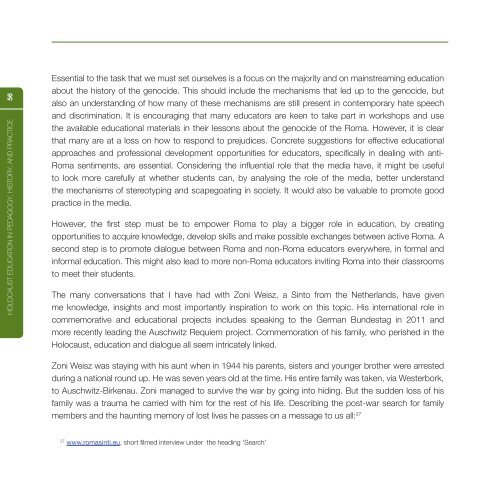2kNreeJ
2kNreeJ
2kNreeJ
You also want an ePaper? Increase the reach of your titles
YUMPU automatically turns print PDFs into web optimized ePapers that Google loves.
HOLOCAUST EDUCATION IN PEDAGOGY, HISTORY, AND PRACTICE 56<br />
Essential to the task that we must set ourselves is a focus on the majority and on mainstreaming education<br />
about the history of the genocide. This should include the mechanisms that led up to the genocide, but<br />
also an understanding of how many of these mechanisms are still present in contemporary hate speech<br />
and discrimination. It is encouraging that many educators are keen to take part in workshops and use<br />
the available educational materials in their lessons about the genocide of the Roma. However, it is clear<br />
that many are at a loss on how to respond to prejudices. Concrete suggestions for effective educational<br />
approaches and professional development opportunities for educators, specifically in dealing with anti-<br />
Roma sentiments, are essential. Considering the influential role that the media have, it might be useful<br />
to look more carefully at whether students can, by analysing the role of the media, better understand<br />
the mechanisms of stereotyping and scapegoating in society. It would also be valuable to promote good<br />
practice in the media.<br />
However, the first step must be to empower Roma to play a bigger role in education, by creating<br />
opportunities to acquire knowledge, develop skills and make possible exchanges between active Roma. A<br />
second step is to promote dialogue between Roma and non-Roma educators everywhere, in formal and<br />
informal education. This might also lead to more non-Roma educators inviting Roma into their classrooms<br />
to meet their students.<br />
The many conversations that I have had with Zoni Weisz, a Sinto from the Netherlands, have given<br />
me knowledge, insights and most importantly inspiration to work on this topic. His international role in<br />
commemorative and educational projects includes speaking to the German Bundestag in 2011 and<br />
more recently leading the Auschwitz Requiem project. Commemoration of his family, who perished in the<br />
Holocaust, education and dialogue all seem intricately linked.<br />
Zoni Weisz was staying with his aunt when in 1944 his parents, sisters and younger brother were arrested<br />
during a national round up. He was seven years old at the time. His entire family was taken, via Westerbork,<br />
to Auschwitz-Birkenau. Zoni managed to survive the war by going into hiding. But the sudden loss of his<br />
family was a trauma he carried with him for the rest of his life. Describing the post-war search for family<br />
members and the haunting memory of lost lives he passes on a message to us all: 27<br />
27<br />
www.romasinti.eu, short filmed interview under the heading ‘Search’


